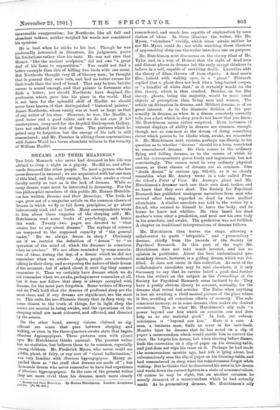DREAMS AND THEIR MEANINGS.*
THE Irish Monarch who never had dreamed in his life was advised to sleep a night in a pig-sty. He did so, and after- wards dreamed like other people. To meet a person who has never dreamed is unusual ; we are acquainted with but one man of this kind, and he, oddly enough, has when awake a visual faculty nearly as rare as is the lack of dreams. While so many dream, some must be interested in dreaming. For the less philosophic members of this public Mr. Horace Hutchin- son has written Dreams and their Meanings. The book, he says, grew out of a magazine article on the common classes of dreams in which we fly or fall down precipices, or go about indecorously clad, and so forth. Many correspondents wrote to him about these vagaries of the sleeping self ; Mr. Hutchinson read some books of psychology, and hence this work. Twenty - two pages are devoted to "what science has to say about dreams." The sayings of science are tempered to the supposed capacity of "the general reader." Do we always dream in sleep ? Obviously not if we restrict the definition of " dream " to "an operation of the mind of which the dreamer is conscious when he awakes." We are often reminded by some associa- tion of ideas, during the day, of a dream which we did not remember when we awoke. Again, people are overheard talking in their sleep, and so exposing the nature of their dream sf the moment ; but if asked about it next day they cannot remember it. Thus we certainly have dreams which we do not remember when we awake, perhaps never remember at all, but it does not follow that sleep is always occupied with dreams, for the most part forgotten. Some writers (d'Hervey and du Prel) hold that the dreams of profound sleep are the most clear, and if any dreams are significant, are the most so. This suits the neo-Platonic theory that in deep sleep we come closest to the truth of things, for in light sleep the senses are nearest to being awake, and the operations of the sleeping mind are most coloured, and affected, and directed by the senses.
On the other hand, among visions claimed as sig- nificant are some that pass between sleeping and Waking, or even in the three-quarters-awake state that begets llsions hyymagogiques. These pictures seen with closed eyes Mr. Hutchinson thinks unusual. The present writer has no statistics, but believes them to be common, especially among children. Mr. Frederick Myers, who never could see goblin, ghost, or fairy, or any sort of "visual hallucination," was very familiar with illusions hypnagogigues. Maury re- garded them as "the stuff that dreams are made of " ; but zhousands dream who never remember to have had experience af illusions hylmagogiques. In the case of the present writer .they are more vivid than his dreams, much more clearly * Dreams and their Meaning,. By Horace Hutchinson. London : Longnunis radio. [9s. Cid. net.]
remembered, and much less capable of explanation by asso- ciation of ideas. In these illusions the writer, like Mr. Myers, " visualises " vividly, which when awake neither he nor Mr. Myers could do ; nor while watching these illusions of approaching sleep can the writer introduce one on purpose.
Mr. Hutchinson next discourses on the theory (that of Mr. Tylor and, in a way, of Homer) that the sight of dead men and distant places in dreams led the early savage thinkers to believe in a self, capable of surviving death. Lucretius adds the theory of films, thrown off from objects. A dead man's film, beheld with waking eyes, is a ghost." Plutarch replied that a ghost does not look like a long-buried corpse, or "a handful of white dust," as it certainly would on the film theory, which is thus crushed. Besides, on the film theory, ghosts, being the majority, would be more usual objects of perception than living men and women. The article on divination in dreams, and Biblical dreams, is of no great interest. As to the dramatic division of the per- sonality in dreams, as when in a dream somebody correctly tells you a fact which in sleep you do not know that you know, Mr. Hutchinson seems rather sceptical. Even instances of unusual displays of ability in dreams are common enough, though not so common as the dream of doing something clever which proves to be idiotic when, awake, we remember it. Mr. Hutchinson next returns, perhaps nee dlessly, to his question as to whether " dreams " should be a term restricted to remembered dreams. He then comes to the ordinary flying and falling dreams, as to the causes of which he and his correspondents guess freely and ingeniously, but not convincingly. The causes must be very ordinary physical causes, as these classes of dreams are so common. One "death dream" is curious (pp. 162-63), as it so closely resembles what Mr. Anstey wrote in a tale called Prom the Ghost's Point of View. Mr. Anstey's ghost and Mr. Hutchinson's dreamier each saw their own dead bodies, and so knew that they were dead. The Society for Psychical Research has published analogous narratives from men who revived after being regarded as dead by their medical attendants. A similar anecdote was told to the writer by a friend, who seemed to himself to leave the body, and be borne he knew not whither. He then heard his dead mother's voice utter a prediction, and next saw his own body in his armchair, and awake. The prediction was not falfilled. A chapter on traditional interpretations of dreams follows.
Mr. Hutchinson then leaves the stage, allowing a collaborator to quote " telepathic " and " premonitory " dreams, chiefly from the records of the Society for Psychical Research. In this part of the topic Mr. Hutchinson does not take much interest, and has no opinion in particular. About the best authenticated pre- monitory dream, however, is a golfing dream, which was ful- filled. It does not occur in this collection. As most of the collaborator's anecdotes may be read elsewhere, it is only necessary to say that he carries belief a good deal further than the writers on the subject in the Proceedings of the Society for Psychical Research seem inclined to do. They have a pretty obvious theory to account, normally, for the dreams that reveal lost articles. The Zulus when anything is lost sit awaiting a vivid mental picture of the place where it lies, avoiding all conscious efforts of memory. The sub- conscious memory, as in some dreams, then makes the desired revelation. This is what Mr. Hutchinson's ally calls "a power beyond our ken which on occasion can and does help us to our material good." In fact, our subcoii- sciousness is "beyond our ken." Here is a case. A man, a business man, finds an error in his cash-book, Months later he dreams that he has noted on a slip of paper a memorandum which would enable him to correct the error. He forgets his dream, but when shaving before dinner, finds the correction on a slip of paper on his dressing-table, and just does not wipe his razor on it. Perhaps he had made the memorandum months ago, had left it lying about, had subconsciously seen the slip of paper on his dressing-table, and had remembered in sleep what his consciousness forgot when waking. But he thinks that he discovered his error in his dream and wrote down the correct figures in a state of somnambulism. Of coarse he may be right, but on another occasion he merely dreamed of a memorandum which he had actually made. As to premonitory dreams, Mr. Hutchinson's ally
(pp. 248-49) appears to have misunderstood what he cites from the Society for Psychical Research Proceedings, where the subject is treated with much more caution than in the work before us. The volume being avowedly "popular," may reach the class of people whom the authors wish to reach. It is not very easy to get at them, for they are terribly afraid of any book that may demand from them the slightest mental effort. Of course, if there really are premonitory dreams, revealing a future beyond the reach of conjecture, and if the theory of chance-coincidence or contaminated record is not adequate, then the moral and metaphysical inferences are such as to stagger the philosopher and the divine, without adding appreciably to the welfare of the world. But "things must be as they may."











































 Previous page
Previous page